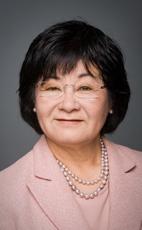Mr. Speaker, the Canadians I speak to in my riding and across the country expect government to deliver on its promises. The citizens of Durham expect action on the gun registry, democratic reform, lower taxes and infrastructure dollars.
In my riding of Durham there are over 1,700 farms and many will not survive the void in the throne speech, a speech that offers little for the agricultural community at this time of crisis. Canadians, like Joe Schwarz, a dairy farmer from Bowmanville who is concerned about losing his livelihood and his business, the family farm that has been in operation for over 60 years.
The agricultural community in Durham and across Canada has been begging the government for some action, for a commitment to the farmers in this country. Farmers want ag dollars to go to those for whom it was intended and they need it now without extensive red tape and delay. They want an open border and markets for their cattle. This is a priority for farmers, producers and all those dependent on agriculture for their living. Let me assure hon. members that the farmers in my riding do not believe this is a priority for the government.
Agriculture is not the only concern of the people in Durham. They are also concerned about the future of health care in rural areas. The throne speech makes a great deal of reference to the recent health care accord, which I am sure will be covered by my colleague, the member for Charleswood—St. James—Assiniboia, but I would like to touch on concerns about rural health care.
Rural and community providers of health care are an important segment of the health care system. Providers, like Lakeridge Health in Durham, have made a valuable commitment to the continued provision of front line services available closer to home. These priorities continue to be important to the people in my riding and in Canada.
The maintenance of local hospitals, the shortage of family doctors willing to practise in rural centres, the recruitment of specialists and the long distances elderly people have to travel to access health care are of great concern to the people in my riding.
The health care accord is a positive step forward and it is my hope that part of the accountability measures will be to ensure that the health care needs of rural Canada are not forgotten.
The riding of Durham is a centre of rapid growth and potential. It has the people and ability needed to expand its industrial base and economic prosperity. This potential is greatly untapped due to its current, inadequate and deteriorating infrastructure. We need new roads, bridges, a regional transit system and commuter services. The government's commitment to a new deal for Canada's cities and communities must ensure that the potential of Durham can be realized.
As the heritage critic, I was of course disappointed to hear little mention of culture, heritage or broadcasting in the throne speech. The heritage ministry is responsible for a budget close to $1 billion a year and yet there is no clear direction in this document to indicate any priorities.
Our priorities would certainly be to ensure that the $9,000 grants given each year by this ministry are accountable, have measurable goals which are balanced and reflect the diverse makeup of our population in the arts and in our peoples.
Over the summer we saw that recent decisions of the CRTC are not meeting the demand for choice in broadcast programming that Canadians want. The CRTC and the Broadcasting Act of 1991 desperately need to be reviewed for this century.
Today, over 14 million Canadians use the cell phone, 14 million from only 2 million in 1994. Today, over 70 million households use the Internet. There were fewer than half a million back then. Satellite TV subscribers have grown from zero to over two million. The speed and scope of advancement in these areas will not decrease but will in fact accelerate over the next decade. The government needs to ensure that legislation and regulation are updated so we can move forward at a speed relevant to the changes in the communications environment.
In this throne speech the government stated, “Smart government includes a transparent and predictable regulatory system”. I believe the review of the CRTC and the Broadcasting Act is called for if the government means what it says.
In 2003 the government refused to support Canada's participation in the ITER program to be sited in my riding in Clarington, a project designed to demonstrate the scientific and technical feasibility of fusion energy for peaceful purposes and a project that would have significantly contributed to the global development of new technology and innovation as well as over 1,300 jobs in my riding.
In this new age technology and innovation is an important part of our economic prosperity. I know that in my riding many businesses and companies are poised to grow and become leaders in the new industrial basis based on exciting technology and innovation. I hope the government actually means to fulfill its latest promise to make communications, technology and innovation a priority.
In conclusion, the Canadians in my riding and the people across Canada want a government that delivers on its promises, that is accountable to its people, that is not afraid to be transparent and that clearly states what it intends to do. In other words, a government we can believe in. I believe it is time for the government to demonstrate that it is listening to all Canadians.

